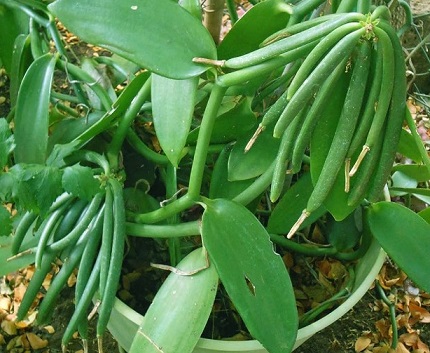Nikhil Prasad Fact checked by:Thailand Medical News Team Oct 25, 2024 1 year, 3 months, 1 week, 4 days, 2 hours, 53 minutes ago
Herbs and Phytochemicals: Vanilla, the popular spice known for its sweet scent and flavor, holds more than just culinary value. Recent research highlights the significant health benefits of vanillin, the primary phenolic phytochemical found in vanilla seeds, in areas such as anti-inflammation, wound healing, and cancer prevention.

The health benefits of the aromatic phytochemical Vanillin from Vanilla seeds
A Compound with Many Benefits
While vanillin has long been appreciated for its aromatic qualities, this compound offers a wide range of health-promoting effects. Researchers from the Hephaestus Laboratory at the Democritus University of Thrace in Greece have published a critical review of vanillin and its derivatives, shedding light on its anti-inflammatory, wound-healing, neuroprotective, and anti-cancer properties.
This
Herbs and Phytochemical news report explore how vanillin can serve as a potent bioactive compound, especially in mitigating inflammation - a key factor in many chronic diseases. From its role in reducing harmful cytokine production to its effectiveness in wound repair, vanillin is proving to be much more than a mere flavor enhancer.
Fighting Inflammation and Chronic Disease
Inflammation, while a natural bodily response to injury or infection, can lead to chronic diseases when it persists unchecked. Studies suggest that vanillin can play a vital role in regulating inflammation, a root cause of ailments such as cardiovascular disease, diabetes, and even cancer. The researchers found that vanillin helps decrease the production of pro-inflammatory cytokines like TNF-alpha, IL-1, and IL-6, while promoting anti-inflammatory mediators.
In various animal models, vanillin reduced inflammation-related damage in organs such as the liver and lungs. For example, in a study on mice with induced colitis, vanillin was shown to significantly improve symptoms by inhibiting NF-kB activities, a key player in inflammatory responses. This indicates its potential as an alternative or adjunct treatment to current anti-inflammatory drugs.
Neuroprotective Benefits: Safeguarding the Brain
Vanillin’s health benefits extend to the brain. Research suggests that this compound’s antioxidant and anti-inflammatory properties could protect neurons from damage. Conditions like Alzheimer’s and Parkinson’s disease, which involve the loss of nerve cells in the brain, are thought to be exacerbated by chronic inflammation. By curbing the production of harmful reactive oxygen species (ROS) and inflammatory cytokines, vanillin may help prevent or slow the progression of these neurodegenerative diseases.
In laboratory studies, vanillin demonstrated protective effects against neurotoxins that induce Parkinson’s disease-like symptoms. Its ability to promote antioxidant activity and inhibit inflammation in the brain shows promise for developing treatments that safeguard against neuronal damage.
Wound-Healing Properties
Wound healing is a co
mplex process that requires controlled inflammation, tissue regeneration, and immune response. Vanillin’s anti-inflammatory and antioxidant effects contribute to its ability to promote faster healing. Researchers explored vanillin’s impact on oral tissue regeneration, where it reduced the production of inflammatory mediators and facilitated wound closure in lab models.
Additionally, vanillin’s derivatives, such as ethyl vanillin, have been tested in hydrogels used for wound dressings. These hydrogels, composed of vanillin-crosslinked polymers, displayed antibacterial properties, making them suitable for treating wounds while preventing infection. The study showed that the hydrogels could promote cell migration and prevent oxidative damage, enhancing their wound-healing capacity.
Vanillin as an Anti-Cancer Agent
Perhaps the most promising area of vanillin research is its anti-cancer potential. The study conducted by the researchers at the Democritus University of Thrace outlines several mechanisms by which vanillin and its derivatives may inhibit cancer cell growth and proliferation. For instance, vanillin has been shown to disrupt the activity of STAT3, a protein involved in cancer cell survival, leading to increased cell death in melanoma cells.
Moreover, vanillin’s anti-metastatic properties were evident in studies where it reduced the migration of cancer cells under hypoxic (low oxygen) conditions. By suppressing the activity of the HIF-1α pathway, vanillin hindered the ability of cancer cells to spread. In mouse models of melanoma, treatment with vanillin significantly reduced tumor size and weight, highlighting its potential as an anti-cancer therapy.
Vanillin Derivatives: Expanding the Horizon
Vanillin’s chemical structure makes it a versatile compound for the creation of derivatives that may further enhance its health benefits. These derivatives can be combined with other compounds or metals to improve their stability, bioavailability, and effectiveness. For example, researchers have developed vanillin-metal complexes, such as a copper-vanillin derivative, which outperformed standard chemotherapy drugs like cisplatin in certain cancer models.
In addition to its anti-cancer properties, these vanillin-metal complexes have shown promise in anti-inflammatory and antimicrobial applications. This opens the door for vanillin and its derivatives to be used not only in medicine but also in food preservation, cosmetics, and even as a component in functional foods.
Conclusion
The review conducted by the researchers from Democritus University of Thrace provides compelling evidence of the health benefits of vanillin and its derivatives. From its anti-inflammatory properties to its neuroprotective, wound-healing, and anti-cancer effects, vanillin is emerging as a powerful bioactive compound with a wide range of applications.
Vanillin’s ability to regulate inflammation, promote tissue repair, and inhibit cancer cell growth makes it a promising candidate for further research and development in nutraceuticals, pharmaceuticals, and functional foods. While more human clinical trials are needed to fully realize its potential, the current findings highlight vanillin’s value beyond its traditional use as a flavoring agent.
The study findings were published in the peer-reviewed journal: Nutraceuticals.
https://www.mdpi.com/1661-3821/4/4/30
For the latest on
Herbs and Phytochemicals, keep logging on to Thailand Medical News.
Read Also:
https://www.thailandmedical.news/news/oxylipins-from-mango-leaves-show-promise-in-reducing-oxidative-stress
https://www.thailandmedical.news/news/moringin-from-moringa-oleifera-with-alpha-cyclodextrin-protects-motor-neurons-from-oxidative-stress-and-degeneration
https://www.thailandmedical.news/news/herbs-and-phytochemicals-oroxylum-indicum-extracts-boosts-brain-health-and-are-neuroprotective
https://www.thailandmedical.news/news/herbs-and-phytochemicals-bergamot-citrus-bergamia-polyphenols-prevent-pathophysiological-events-linked-to-red-blood-cell-dysfunction-during-aging
https://www.thailandmedical.news/articles/herbs-and-phytochemicals
